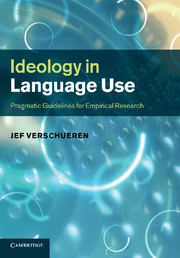1 - Language use and ideology
Published online by Cambridge University Press: 05 January 2012
Summary
Though the concept started its career that way, ‘ideology’ is no longer seen as the systematic analysis of sensations and ideas which should provide the basis for all scientific knowledge. Ideology is no longer an academic discipline, but rather an object of investigation. It is related to ideas, beliefs, and opinions, but this relationship is not a straightforward one. Ideas, beliefs, and opinions, as such, do not make ideology. Simplifying a bit, they are merely ‘contents of thinking,’ whereas ideology is associated with underlying patterns of meaning, frames of interpretation, world views, or forms of everyday thinking and explanation. Thus the ways in which beliefs, ideas, or opinions are discursively used, i.e. their forms of expression as well as the rhetorical purposes they serve, are just as important for ideology as the contents of thinking for which these three terms serve as labels.
Let me illustrate this first point by asking whether there is anything ideological about an utterance such as the final one in the introduction to this book:
A methodologically adequate approach should enable two researchers to sensibly compare and evaluate their results beyond the mere voicing of contrasting opinions.
This utterance certainly expresses an idea or opinion and – unless it is insincere – a belief. In order to identify ideological content, however, a deeper level of meaning would have to be found that we may expect to serve as a wider frame of interpretation or as a pattern of explanation that can be directed at multiple targets, thus with the potential of transcending the ad hoc character of the example under consideration. One such meaningful element, reflected in but not recoverable with certainty from the quoted utterance, could be the general way of thinking about language (i.e., possibly a ‘language ideology’) that enables the author to refer to “the mere voicing of contrasting opinions.” Implicitly, this phrase presents language (“voicing”) as a potentially straightforward (“mere”) vehicle for the expression of ideational contents (“opinions”) which may be identifiably separable (“contrasting”) entities. Let us call this perspective on language, for the time being, the ‘vehicle view of language.’ Whether the present author actually subscribes to that view is irrelevant at this point but will have to be addressed later.
- Type
- Chapter
- Information
- Ideology in Language UsePragmatic Guidelines for Empirical Research, pp. 7 - 20Publisher: Cambridge University PressPrint publication year: 2011
- 1
- Cited by



